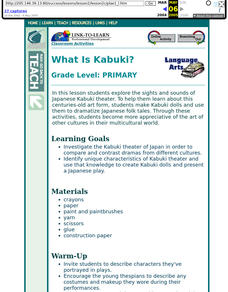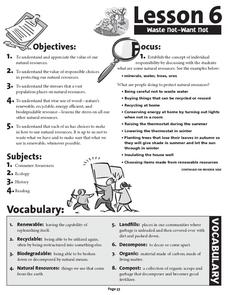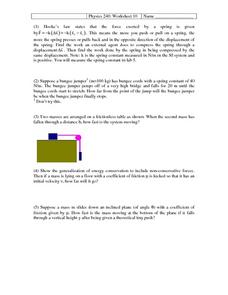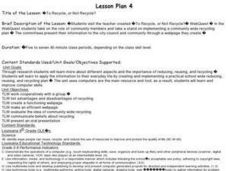University of Waikato
Water Issues
Water may be everywhere but it is not always drinkable. Pupils research water issues, first in a local setting and then with Papua New Guinea and Australia to get a larger world perspective. Teams use the Internet and other resources to...
National Wildlife Federation
Understanding and Measuring School Electronics
Feel the power in turning off electronics. Using energy-monitoring devices, pupils find the amount of energy it takes to power a simple electronic when it is on and when it is off. They then calculate the cost for the entire year for the...
Curated OER
Classroom Conservation
Fourth graders suggest ways paper and other natural resources can be used and recycled in the classroom. Students conduct a investigation into paper use and make distinctions among observations, conclusions (inferences), and predictions.
Curated OER
Kids for Conservation Lesson 1
Third graders observe various demonstrations dealing with the water on our earth, such as a comparison of the amount of salt water and fresh water on earth, then participate in a role playing activity in which they become a molecule of...
Curated OER
Global Warming: Life in a Greenhouse
Students examine the evidence that scientists have used to support the existence of global warming and the greenhouse effect. How the concepts have been developed and evaluated form the focus of this lesson.
Curated OER
Measure It Up!
Students investigate the states that water may take. In this physical science lesson, students read the book, Water: Up, Down, and All Around and recall the states of water from the book. Students examine how water takes the shape of its...
Curated OER
Exploring Alternative Energy Sources
Students research the amount and kinds of energy that are produced and consumed in the United States, including the limitations of this kind of consumption. They research and create a display to teach classmates about a specific...
Curated OER
Waste Not Want Not
Students are introduced to the need to save natural resources. Through inquiry, hands-on activities, and problem solving, students increase their understanding of solid waste materials and the need to reduce, recycle, and reuse.
Alabama Learning Exchange
Energy and Work Amusement Park Style
Students distinguish between kinetic and potential energy. They recognize that energy can change from one form to other forms. They identify and describe several forms of energy.
Curated OER
The Value of a Garden
Students explore the history of taxonomy, the work of Carl Linnaeus, and the factors involved in the decline and extinction of a variety of botanical species.
Curated OER
Water: Our Most Important Beverage
Third graders complete a KWL chart on what they already know about water and what they want to know. As a class, they participate in an activity in which they discover the amount of drinkable water on Earth and are introduced to the...
Curated OER
Introduction to Materials Science - Part B
Students are able to give specific examples of what to do and what not to do during given safety situations, and classify materials as metals, polymers, ceramics/glass, or composites. They are able to distinguish between chemical and...
Curated OER
What is Momentum?
In this momentum worksheet, students will calculate the maximum forward momentum of the Apollo 11 lunar spacecraft at three different stages of its space travel.
Curated OER
Physics 240:10
For this physics 240:10 worksheet, students calculate the speed and distance as presented in the given word problems. Students apply their understanding of Hooke's law to answer the questions provided.
Curated OER
What are Atoms?
In this atom worksheet, learners read about Dalton's contributions to the structure of the atom. They answer five questions about Dalton's ideas, the law of multiple proportions and the law of definite proportions.
Curated OER
Heat Transfer & Phase Changes
In this heat transfer and phase change worksheet, students experiment with ice, salt, and milk to show the relationship between the temperature of a solution and its phase. Students turn milk from a liquid to a solid and graph the...
Curated OER
What happens to water before we use it?
Students examine how water is treated prior to becoming available for human consumption. In this water treatment lesson, students conduct an experiment in which they filter water. Students formulate a hypothesis, test, analyze data, and...
Curated OER
How Much Energy Do You Use?
Students take a survey of energy-consuming appliances in their homes and calculate the daily cost of operating these machines. They identify those appliances that consume the most energy and consider ways to reduce the amount of energy...
Curated OER
Energy: The Universal Currency
Science stars examine the concept of energy by thinking about everyday situations. The lesson plan is incohesive. It lists goals for the student, but doesn't address all of them in the content. The best use of this resource would simply...
Curated OER
Erosion
Young scientists identify erosion, explain the causes of erosion, and name some techniques that can slow the process of erosion. Learners are divided up into groups of four and perform a simulation of soil erosion in class. The...
Captain Planet Foundation
P is for Poppies
Explore the way local farming and rationing helped the war effort in World War I with a lesson plan on gardening. After learning about trench warfare, reading "In Flanders' Field" by John McCrae, and studying poppies, kids discuss the...
Curated OER
To Recycle, or Not Recycle?
To recycle or not to recycle, that is the question. Your class can find the answer by taking a teacher created WebQuest, where they assume a role of a community member taking a stand on implementing a community wide recycling plan. The...
Curated OER
Introduction to Photovoltaic Systems
The Green Education Foundation found that this lesson plan, written by the Texas State Energy Conservation Office, is right up their alley when it comes to teaching sustainability. It is ideal as a first lesson plan on photovoltaic...
Other popular searches
- Wildlife Conservation
- Water Conservation
- Marine Conservation
- Conservation Issues
- Conservation of Mass
- Conservation of Energy
- Conservation of Matter
- Energy Conservation
- Conservation of Momentum
- Law of Conservation of Energy
- Soil Conservation
- Law of Conservation of Mass

























